THE THIRD XIAOZHOU-ART FESTIVAL: SAFARI
| December 1, 2010 | Post In LEAP 6

As with all cities whose cultural resources are unevenly distributed, the most lively art spaces in Xiaozhou village were once scattered along the periphery. But now, with the XiaoZhou-Art Festival, the town has come alive. After the successful hosting of three sessions, the event has already become Guangzhou’s most dynamic folk art festival, a low-cost experimental playground for local artists, art students, young curators, and all manner of art youths. The festival is akin to an enormous cultural supermarket; the choices available are seemingly endless and there is something for everyone. Hipsters enjoy a spirited festival more than they do a contemporary art exhibition; art students are thrilled to take to dreaming up ways that they might be admitted to participate in the next round; tourists love to browse the array of creativity, go to the market, visit the illustration exhibition, and take memento photographs in front of Xiaozhou’s old buildings, often without giving a thought to the exhibits inside of them.
One can foresee the XiaoZhou-Art Festival in coming years thriving with more revelry, more popular support, and even better business prospects. But visions of the festival’s future do not obscure our discovery of its present; before us, inside the festival’s multimedia units, are several quality exhibits: “Subtropical,” curated by Zeng Weifeng, showcases the new look of the young generation of painters local to Guangzhou; “I, Who,” a contemporary art exhibition curated by artist Feng Lipei, explores the possibilities of collaboration among artists; located in Xiaozhoucun Village hall, “A Certain State” has garnered the most attention, both for its curatorial concept and for its selection of works. Curator Zhang Jiaping’s preface especially captures the imagination of the audience; it relates the dubious story of the relationship between a 48 year-old curator and his young female assistant. What at first glance might seem like a bold, self-revealing choice is belied by the fact that Zhang himself is a young, handsome lad, dissimilar to the story’s main character. Perhaps he is satirizing the unwritten rules of the art world; perhaps he is just telling a story. Regardless, the works in the exhibit are full of undetected stimuli. This is not to say that they are impossible to understand, but rather that they do not over-emphasize their visuality; the audience must spend that much more time interpreting, experiencing, and engaging with them. Song Tuo’s work, The Weight of Fresh, is arranged on the assembly hall’s main stage. Different colored balloons are suspended according to the normal growth height of several types of fruit (banana, pineapple, pear, etc); each balloon suspends each type of fruit at its respective height. As time passes, the fruit proceeds to rot, the balloons proceed to leak, and the height at which the fruit is suspended proceeds to decrease. Artist Frank Gerlitzki placed a bright spotlight in a shopping cart. The shadow that hits the wall has a powerful impact; the crowd passing through experiences the illusion of being hemmed into a prison of light and shadow. Zhou Qinshan’s Oppenheim-esque work, Aphasia, replaces the rolling wheel of a mortar grinder with fur. Project notes and proposals are exhibited alongside the finished works, offering a sense of how budget and other considerations enter these artists’ working processes.
All of the attention that the XiaoZhou-Art Festival has received is an opportunity to step back and observe the state of the arts in Guangzhou overall. The grassroots spirit and primitive face of the XiaoZhou-Art Festival are not a result of planners Chen Qian and Que Zhenggang’s conscientious refusal of various sources of capital intervention; on the contrary, they spend most of their time raising their small budget. Rather, the XiaoZhou-Art Festival accords with the generally sporadic nature of contemporary art events in Guangzhou; if some day the two festival curators let go of this hot potato, it is hard to imagine who would take it in their hands next. Wu Jianru


